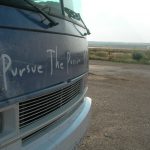Phoenix Rowel had a serious problem with alcohol. She had worked for IBM for 17 years in her first real job out of college. She was very successful despite her long nights of drinking, followed up by early morning meetings. For some reason she had no problem fighting off the hangovers and pulling it together at work, but her life was beginning to fall apart.
Desperate for a change, she enrolled in Alcoholics Anonymous to try and kick her drinking habit. She left the corporate culture at IBM, and began her long road to recovery and her coincidental discovery of her passion.
When we met with Phoenix, she was five days away from celebrating her 16th year of sobriety, and was on her way out of town to celebrate her 14th year anniversary with her husband. On the muggy Chicago day we agreed to a picnic, but we opted instead to hold our interview the Pursue The Passion headquarters, (Starbucks) to avoid the humid, 93 degree weather. Phoenix brought us homemade ham sandwiches and chips, and over the course of lunch we heard her story of how she uncovered and is pursuing her passion.
After she decided to make the change, she fought the battles of alcoholism through the nurturing guidance of AA, as she went through their infamous 12-step program. It took her a year and half to kick the habit, and eight years after she quit drinking she was given a phone call that would change her life. It was from an AA counselor that wanted her help with a special “project.” The “project” that the counselor referred to was entering a maximum security prison filled with teenage girls, and sharing her experiences with alcoholism to the inmates. She felt that she had to act on this opportunity despite never stepping foot in a prison, so she agreed.
To give a little background information about AA’s history in prisons, AA began to go into prisons in 1942 to help prisoners recognize they had a problem and helped them recover from their addictions so they wouldn’t commit similar alcohol-related crimes. These programs started despite the lack of popularity and opposition from most prison wardens. The facts were undeniable however, as 80% of the people arrested and imprisoned were under the influence of drugs or alcohol at the time of the arrest. 80% of these inmates ended up back in prison. AA was called in to address this problem, with the hopes of decreasing the recidivism rate in prisons. It worked.
With the AA program in place, only 20% of the prisoners that went through the program came back to jail after their treatment. After Phoenix spoke with the girls, something in her heart felt that she had found a new cause and a purpose: to give these women hope that alcohol would no longer control their lives.
Over the next six years she was devoted to using the AA program to make a difference by connecting her experiences with alcohol to those of the hardest criminals. But in the third quarter of 2004, Phoenix decided that there needed to be something more. Although the AA meetings were effective for most prisoners, they were not effective for the ones had no desire to quit their alcohol and drug abuse. To address this problem, she started researching community building.
She started by looking at community building within prisons, and what kind of programs were currently being run around the country. With these programs, she began to notice how similar community building programs were to AA. She developed a vision of how the two programs, used together could reduce recidivism in prisons.
Acting on this vision, she began to find many coincidences in her research. She found a person, living two blocks away from her, who specialized in getting ideas like hers off the ground. She began to sense that this is what her life’s work was meant to be; the reason why she had worked at IBM for all those years, why she had fought through the struggles of alcohol, and why she had been exposed to the hardships of prison over the past decade.
In her research, she discovered that San Quentin has a wonderful community building program in place. So, she bought a ticket to see if it was for real. She did the same for a program in Virginia, and then again in New Orleans. She started to assemble different pieces from these programs, and utilized the information to build her vision.
Returning home with a fresh perspective and a new determination to carry out her passion, she took small steps to execute what she thought would be an effective program. She went to Border’s and bought a non-profit book for dummies. She filled out a non-profit application, and found people to sit on her board of directors.
Then it was time to get real with the whole idea. She was told that forming a non-profit would take $200k to get started. To help finance this, she made up her mind that her lifestyle could change in order to help her pursue her dream. She sold her house, and decided to live off the proceeds and social security benefits to help her finance her org.anization.
Currently, Phoenix is still in pursuit of her passion. Her vision for her non-profit, entitled SMILES Behind Bars, consists of improving the literacy and communication skills of prisoners, while also helping them identify their passions in life. She plans on building a private network of employers willing to give rehabilitated prisoners a legitimate shot at employment. This would increase the chances of released inmate finding employment. Currently, just 1 out of every 3 prisoners is able to finds work after their release. Moretime working means less time, available to get in trouble. It seems obvious that such a program would reduce, the recidivism rate of prisoners. This would improve the well-being of the American public in general.
Her advice to anyone willing to listen and take it to heart is:
“Look deep, pray for your heart’s desire, pay attention to what you love, and follow your inner passion.”
Author’s Note:
Phoenix Rowel is a fictitious name to protect the anonymity of a member of Alcoholics Anonymous. I named her “Phoenix” because in the dictionary, “Phoenix” is more than a city in Arizona, it is a mythological character that consumes itself from fire after 500 years, and then renews itself from its ashes. Although the story is not that drastic, she did consume herself with alcohol, and essentially renewed herself from her mistakes. The “Rowel” name was picked at random by opening a dictionary.
I think that this story covers many of the aspects that prevent people from pursuing their passions in life. The first and often times most difficult is discovering this passion. For Phoenix, it did not come until she was 52 years old. What was interesting is that her whole life she had unknowingly been given the skills to pursue this passion.
The next step was to take the leap of faith and actually pursue it, which is another place where people fall out of the picture. Phoenix did what was necessary to execute her dreams by going and getting the experience to build an effective SMILES Behind Bars program, something she could not have done without the knowledge and insight she gained by traveling to places like San Quentin, Virginia, and New Orleans.
Then, there is a financial aspect, where the majority of people forget about passion. People tend to fall into a philosophy that they first have to save enough money, or their kids have to move out of the home, or some event has to occur before they can follow their dreams. But Phoenix saw the significance of her passion and would not accept this “philosophy.” She sold her house to help finance her formation of a non-profit organization. Although it was not a “safe” choice by any standards, especially taking into consideration her age, she felt compelled to take the necessary risk to make it happen. And risk taking is something that people seem to be afraid of. Phoenix Rowel is not one of those people.






